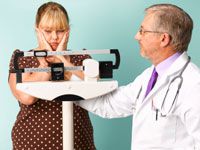By Shaun Chavis
Former supermodel Emme is part of a new campaign to help people feel better about the skin they're in. As the first full-figure supermodel, she's a champion of what she calls the “diversity of beauty”—including beauty at any size. Now, she's fighting size discrimination in the doctor's office. Her message? "No one should ever be put into a position that they feel shame in their doctor's office, no matter what!"
Almost 70% of overweight and obese women say they've experienced weight bias in the doctor's office, according to research from the Rudd Center for Food Policy and Obesity at Yale University. And as many as 81% of dietetic students—the next generation of RDs who will be on the front lines of fighting the obesity crisis—have prejudices about overweight and obese people, according to a new study from Rudd, published this month in the Journal of the American Dietetic Association. No wonder so many of us are nervous about sitting across from a skinny-minny dietitian!
 embarrassed-weight-fat-200.jpg .
embarrassed-weight-fat-200.jpg .
If you are afraid to go to the doctor because you're nervous about how you look, then you're less likely to go and less likely to receive important screenings. I once had a technician get frustrated with me once during a mammogram. She might not run into a pair of DD's everyday, but I don't want to hear her complain about it, especially when I'm the one getting poked and prodded. It certainly didn't make me look forward to future mammograms!
If you do go, self-consciousness about your weight might make it hard to talk about your concerns. Size discrimination doesn't simply affect overweight and obese patients. "Weight bias keeps fear in a size 4 woman for being a size 4, even when she’s 5’11,” Emme said in a phone interview.
Take charge of your health care
Obesity can be a tough topic to breach, for doctors and patients. So Emme made an educational video for docs and other health-care providers. (She's also done one about children, families, and weight bias; I'll blog about that soon.) If you're on the flip side—a patient who's nervous about what the doc or nurse will say once you're in that lovely paper gown—here are some ways you can take control and get the (sensitive!) care you need, courtesy of The Rudd Center:
- Nervous about stepping on the scale? If your weight is pretty much the same since your last visit, say so, and say you'd rather not be weighed. If it's necessary, though, you can stand on the scale backward so you won't see the numbers.
- Ask a good friend to go to appointments with you.
- Be direct about how you want to talk about your size. You can include everything from how often you want to be weighed, what words you'd like to use when referring to your size, and how you want to talk about your weight when it's a factor in your condition.
- Don't brush off a clear case of size bias. Instead, speak with the patient advocate—nearly every health-care center and hospital has one.
Does any of this ring true to you? I would really like to hear the struggles and frustrations (and rants!) about your experiences…and how you cope.
